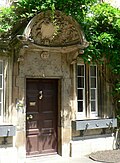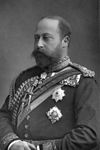Portal:University of Oxford
| Main page | Indices | Projects |
The University of Oxford portal
The University of Oxford is a collegiate research university in Oxford, England. There is evidence of teaching as early as 1096, making it the oldest university in the English-speaking world and the world's second-oldest university in continuous operation. It grew rapidly from 1167, when Henry II banned English students from attending the University of Paris. After disputes between students and Oxford townsfolk, some Oxford academics fled northeast to Cambridge, where, in 1209, they established the University of Cambridge. The two English ancient universities share many common features and are jointly referred to as Oxbridge.
The University of Oxford is made up of 43 constituent colleges, consisting of 36 semi-autonomous colleges, four permanent private halls and three societies (colleges that are departments of the university, without their own royal charter), and a range of academic departments which are organised into four divisions. Each college is a self-governing institution within the university, controlling its own membership and having its own internal structure and activities. All students are members of a college. The university does not have a main campus, but its buildings and facilities are scattered throughout the city centre. Undergraduate teaching at Oxford consists of lectures, small-group tutorials at the colleges and halls, seminars, laboratory work and occasionally further tutorials provided by the central university faculties and departments. Postgraduate teaching is provided in a predominantly centralised fashion.
Oxford operates the Ashmolean Museum, the world's oldest university museum; Oxford University Press, the largest university press in the world; and the largest academic library system nationwide. In the fiscal year ending 31 July 2023, the university had a total consolidated income of £2.92 billion, of which £789 million was from research grants and contracts.
Oxford has educated a wide range of notable alumni, including 31 prime ministers of the United Kingdom and many heads of state and government around the world. As of October 2022,[update] 73 Nobel Prize laureates, 4 Fields Medalists, and 6 Turing Award winners have matriculated, worked, or held visiting fellowships at the University of Oxford, while its alumni have won 160 Olympic medals. Oxford is the home of numerous scholarships, including the Rhodes Scholarship, one of the oldest international graduate scholarship programmes. (Full article...)
Selected article
The Principal and Fellows of Jesus College form the college's governing body. The Principal must be "a person distinguished for literary or scientific attainments, or for services in the work of education in the University or elsewhere", and has "pre-eminence and authority over all members of the College and all persons connected therewith". The Principal's Lodgings (entrance pictured) are in the first quadrangle of the college. The current Principal, Lord Krebs, was appointed in 2005 and is the 30th holder of the office. Professorial Fellows are those Professors and Readers of the university who are allocated to the college. One of these professorships is the Jesus Professor of Celtic, which is the only chair in Celtic studies at an English university. Official Fellows are those who hold tutorial or administrative appointments in the college. Past Official Fellows include the composer and musicologist John Caldwell, the historians Sir Goronwy Edwards and Niall Ferguson, the philosopher Galen Strawson and the political philosopher John Gray. There are also Senior and Junior Research Fellows. Principals and Fellows who retire can be elected as Emeritus Fellows. The college can also elect "distinguished persons" to Honorary Fellowships. (Full article...)
Selected biography
Selected college or hall
Regent's Park College (colloquially "Regent's") is one of the Permanent Private Halls (PPHs) of the University of Oxford. Unlike the colleges, which are run by their Fellows, PPHs are run by an outside institution – in the case of Regent's, the Baptist Church. It started as the Stepney Academy in East London in 1810, created to teach Baptists at a time when only members of the Church of England could enter Oxford and Cambridge. It moved to Regent's Park in London in 1855, and took its current name, developing links with the University of London. H. Wheeler Robinson (Principal 1920–42) decided to move the college to Oxford, which he thought was a more congenial setting. A site was purchased in 1927 and fundraising for a new building began. The foundation stones were laid in 1938, and Regent's became a PPH in 1957. Women have been admitted since the 1920s. It has about 100 undergraduates and 90 postgraduates, including those training for Baptist ministry in the UK and abroad. Alumni include the Victorian general Sir Henry Havelock (active during the Indian Rebellion), the legal scholar Malcolm Evans, the theologian Jane Shaw and the Baptist missionary Donald Foster Hudson. (Full article...)
Selected image

Did you know
Articles from Wikipedia's "Did You Know" archives about the university and people associated with it:
- ... that Welsh politician David Lloyd George (pictured) said that he would prize no honour more highly than his Honorary Fellowship of Jesus College?
- ... that Thomas Johnes planted three million trees to make his Hafod Uchtryd estate picturesque?
- ... that the position of Dean Ireland's Professor of the Exegesis of Holy Scripture at Oxford was endowed by John Ireland, who was Dean of Westminster for more than 25 years?
- ... that deforestation in Staffordshire inspired contributions from Erasmus Darwin and Anna Seward to a book of poetry about Needwood Forest by Francis Mundy?
- ... that medieval scholar Erika Cheetham interpreted Nostradamus' writings as prophecies of Napoleon, Hitler, and the establishment of modern Israel?
Selected quotation
Selected panorama
Wikimedia
The following Wikimedia Foundation sister projects provide more on this subject:
-
Commons
Free media repository -
Wikibooks
Free textbooks and manuals -
Wikidata
Free knowledge base -
Wikinews
Free-content news -
Wikiquote
Collection of quotations -
Wikisource
Free-content library -
Wikiversity
Free learning tools -
Wikivoyage
Free travel guide -
Wiktionary
Dictionary and thesaurus















